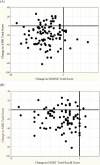Prodromal Alzheimer's disease can affect activities of daily living for adults with Down syndrome
- PMID: 38476636
- PMCID: PMC10927922
- DOI: 10.1002/dad2.12562
Prodromal Alzheimer's disease can affect activities of daily living for adults with Down syndrome
Abstract
Introduction: Alzheimer's disease (AD) affecting adults with Down syndrome (DS-AD), like late-onset AD (LOAD) in the neurotypical population, has preclinical, prodromal, and more advanced stages. Only tasks placing high demands on cognition are expected to be affected during the prodromal stage, with activities of daily living (ADLs) typically being spared. However, cognitive demands of ADLs could be high for adults with DS and may be affected during prodromal DS-AD.
Methods: Cognitively stable cases that subsequently developed prodromal DS-AD were identified within a set of archived data from a previous longitudinal study. Measures of ADLs and multiple cognitive domains were examined over time.
Results: Clear declines in ADLs accompanied cognitive declines with prodromal DS-AD while stability in all measures was verified during preclinical DS-AD.
Discussion: Operationally defining prodromal DS-AD is essential to disease staging in this high-risk population and for informing treatment options and timing as new disease-modifying drugs become available.
Highlights: Cognitive and functional stability were demonstrated prior to the onset of prodromal DS-AD.ADL declines accompanied cognitive declines as adults with DS transitioned to prodromal AD.Declines in ADLs should be a defining feature of prodromal AD for adults with DS.Better characterization of prodromal DS-AD can improve AD diagnosis and disease staging.Improvements in DS-AD diagnosis and staging could also inform the timing of interventions.
Keywords: Alzheimer's disease; Down syndrome; activities of daily living; mild cognitive impairment; prodromal Alzheimer's disease.
© 2024 The Authors. Alzheimer's & Dementia: Diagnosis, Assessment & Disease Monitoring published by Wiley Periodicals LLC on behalf of Alzheimer's Association.
Conflict of interest statement
The authors declare no conflicts of interest. Author disclosures are available in the supporting information.
Figures

Similar articles
-
Validity of one-time assessments for identifying prodromal Alzheimer's disease in adults with Down syndrome.Alzheimers Dement (Amst). 2025 Feb 11;17(1):e70076. doi: 10.1002/dad2.70076. eCollection 2025 Jan-Mar. Alzheimers Dement (Amst). 2025. PMID: 39935890 Free PMC article.
-
Cognitive Function during the Prodromal Stage of Alzheimer's Disease in Down Syndrome: Comparing Models.Brain Sci. 2021 Sep 16;11(9):1220. doi: 10.3390/brainsci11091220. Brain Sci. 2021. PMID: 34573242 Free PMC article.
-
Individualized estimated years from onset of Alzheimer's disease- related decline for adults with Down syndrome.Alzheimers Dement (Amst). 2023 Jun 27;15(2):e12444. doi: 10.1002/dad2.12444. eCollection 2023 Apr-Jun. Alzheimers Dement (Amst). 2023. PMID: 37389223 Free PMC article.
-
Souvenaid for Alzheimer's disease.Cochrane Database Syst Rev. 2020 Dec 15;12(12):CD011679. doi: 10.1002/14651858.CD011679.pub2. Cochrane Database Syst Rev. 2020. PMID: 33320335 Free PMC article.
-
Down syndrome and Alzheimer's disease: A scoping review of functional performance and fall risk.Alzheimers Dement (N Y). 2023 May 22;9(2):e12393. doi: 10.1002/trc2.12393. eCollection 2023 Apr-Jun. Alzheimers Dement (N Y). 2023. PMID: 37228575 Free PMC article.
Cited by
-
Validity of one-time assessments for identifying prodromal Alzheimer's disease in adults with Down syndrome.Alzheimers Dement (Amst). 2025 Feb 11;17(1):e70076. doi: 10.1002/dad2.70076. eCollection 2025 Jan-Mar. Alzheimers Dement (Amst). 2025. PMID: 39935890 Free PMC article.
-
The association of dementia risk symptoms and functional activity in adults with Down syndrome.Alzheimers Dement (N Y). 2024 Oct 10;10(4):e70007. doi: 10.1002/trc2.70007. eCollection 2024 Oct-Dec. Alzheimers Dement (N Y). 2024. PMID: 39748853 Free PMC article.
References
-
- Albert MS, DeKosky ST, Dickson D, et al. The diagnosis of mild cognitive impairment due to Alzheimer's disease: recommendations from the National Institute on Aging‐Alzheimer's Association workgroups on diagnostic guidelines for Alzheimer's disease. Alzheimers Dement. 2011;7(3):270‐279. doi:10.1016/j.jalz.2011.03.008 - DOI - PMC - PubMed
Grants and funding
LinkOut - more resources
Full Text Sources
